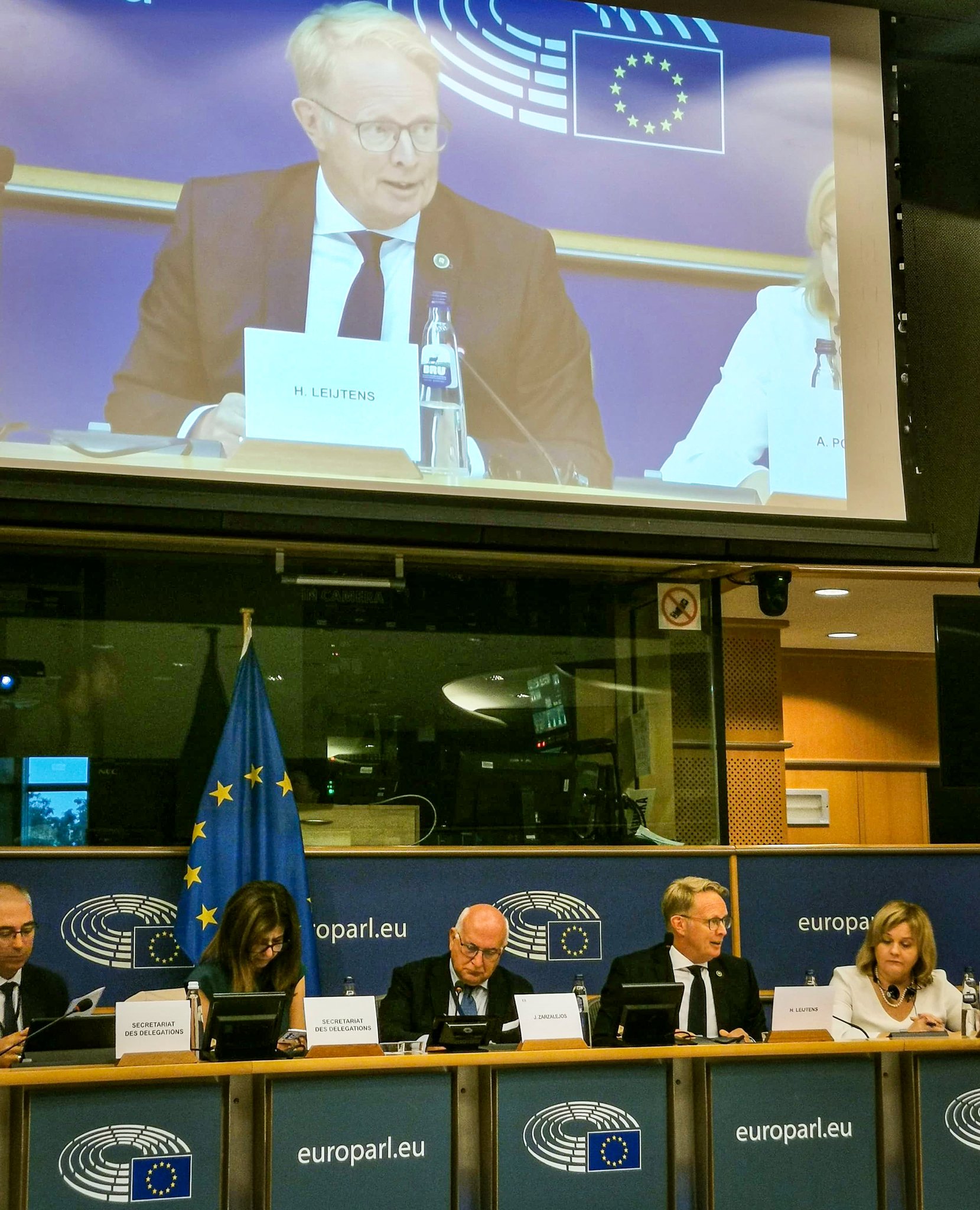Can Frontex Embrace a Policing Culture of Public Service?
Posted
Time to read
Guest post by Covadonga Bachiller López and Ciara Aucoin Delloue. Covadonga holds a Ph.D in Law from Teesside University, where she conducted an ethnographic study on Frontex. Ciara holds a Ph.D on public order policing from Ulster University.
In his first appearance before the new European Parliament Committee on Civil Liberties, Justice and Home Affairs in September 2024, Frontex Executive Director Hans Leijtens shared his vision for transforming the EU border agency and adopting “a more law enforcement culture”.
This vision is not entirely new: former Director Fabrice Leggeri also sought to strengthen Frontex’s law enforcement role, notably through an expansive surveillance programme. However, Leijtens’ pays emphasis on strategy, culture and design, in contrast to the crime-focused narrative favoured by his predecessor.
Crucially, Leijtens proposes a significant "cultural shift" based on the "UK Peelian Principles," as noted in an internal document. In Europe, particularly in England, some police institutions have, with mixed results, tried to incorporate these principles to address excessive use of force and brutality against racialised communities by shifting their identity from one rooted in force and crisis response to one focused on public service and accountability.
The key question is: Is Leijtens prepared to lead this transformation into a public facing organisation that is accountable to the public, including migrants, open to inquiries and challenge, and even genuine reform? Ultimately, can an agency involved in racialized border control ever be reformed in a manner that is compatible with human rights?

A culture of ‘serve and protect’ for Frontex
In July, Frontex hosted a workshop with national authorities to define the “optimal model” for its future, focusing on exploring the meaning of a “law enforcement culture.” The report from the workshop highlights essential values for this shared culture, including commitments to "safety and trust," "accountability," "dialogue, cooperation, ethics, and humanitarian culture," as well as long-standing references to "transparency, openness, and respect for human rights."
This search for a unified culture comes amidst criticism of Frontex’ lack of accountability and for its (in)direct complicity in illegal practices including pushbacks and various forms of border brutalities.
Since taking office in March 2023, Leijtens has pledged to put an end to pushbacks in Frontex operations. More recently, during his speech at the European Parliament, he spoke of fostering a culture of "serve and protect." However, moving towards a culture of service raises an important question: Who exactly is Frontex serving and protecting? In his speech, Leijtens emphasized that “saving lives is more important than anything else” noting that a
“security frame should not stop us from saving lives. Because this is our first job. This is what we vowed when we promised to serve and protect and the same applies to migrants”.
Leijtens may be compelled to make such rhetorical appeals in public, given ongoing challenges to Frontex’ legitimacy. But revealingly, migrants are erased from the Frontex Vision 2027, obscured by the agency’s overarching goal to “predict, detect and prevent challenging situations from reaching external borders”.
Frontex Vision 2027 closely aligns with the Commission’s migration management approach, which has shaped migration policy since the 2015 ‘crisis’ in Greece and culminated in the adoption of the EU Pact on Migration and Asylum last year. At its core, this approach promotes the idea that migration can be managed through technical solutions, presenting migration management as a rational, civilized way to address the ‘challenges’ of unauthorized migration.
During the July workshop that aimed to operationalise this strategic vision, there was also a clear absence of any reference to migrants and their rights. Instead, participants underscored Frontex’s core purpose: “commitment to ensuring the security of citizens and protecting borders” while simultaneously claiming that “in dangerous situations, there is no time for democracy”. These statements show that the commitment to public oversight and accountability is fragile and secondary to the overriding imperative of border control. They also reflect contradictory conceptions of whom Frontex is ‘protecting’: the citizen and the migrant on one hand and, the citizen from the migrant, on the other.
For Frontex, adopting a Peelian model focused on public service and public accountability, would be a gargantuan task.
First, the majority of individuals Frontex officers encounter are non-citizens who lack the means to hold officers accountable for what they witness and experience. Their non-citizen status also means they do not have access to the media and democratic channels such as elected officials, complaint mechanisms, or tribunals, and complicates their ability to organise and advocate for their rights.
Moreover, interactions with migrants frequently occur in spaces that are largely inaccessible to the public —think of the militarised Evros border, the debriefing interview, or secret facilities used for unlawful detention and deportation— further eroding oversight and accountability.
Finally, Frontex’s strategic guidance and performance metrics are based on narrow criteria of success. The agency’s Multiannual Strategic Policy prioritises goals such as the “effective prevention of unauthorized crossings” and “future-proof(ing) the external borders”, with success measured by reductions in irregular arrivals and increased deportations rather than by service or response to those they engage.
Rather than a citizenry being served, migrants are being managed by Frontex – often through violent means.
Will a cultural shift save Frontex?
Last October marked 20 years since the creation of Frontex, an agency which has grown significantly from six staff members to over 3,000 officers deployed at the EU’s external borders in 2024. Strengthening the agency remains a priority in the new European Commission’s 2025-2030 political guidelines, with plans to expand Frontex’s workforce to 30,000. This expansion runs alongside a persistent problem of legitimacy. Civil society organisations and migrants themselves have repeatedly documented a glimpse of the brutalities taking place at EUrope’s borders. Frontex officers have been directly implicated in, and witnessed violations committed by their national counterparts. EU oversight bodies have questioned the agency’s compliance with its fundamental rights and transparency obligations (see here, here and here). Worryingly, Leijtens appears to dismiss such criticisms as mere “allegations” that lack “evidence”.
Moving from such a minimally accountable organization to one that embodies Peelian principles of service and accountability would be a welcomed change. However, the push for a cultural shift inside the agency is likely to be merely another attempt to "fix" the problem of legitimacy. Police culture is created and produced through practice and, crucially, deeply embedded within an external socio-political context. Further, evidence shows that police culture is durable against reform (see here and here).
Genuine police reform seeks to address police brutality and institutional racism through a myriad changes to structural, institutional and value-based systems – changes that go far beyond a managerialist approach. Yet, when we examine Frontex’ policies and reporting metrics, it becomes clear that EU border policing is being driven by deterrence and deportation, which stands far from vision of a public-facing and serving police agency. In such a political environment, the violent realities at EU borders risk being dressed up as Peelian policing, where service is ultimately reduced to “protecting” EUrope against unwanted others.
Any comments about this post? Get in touch with us! Send us an email, or post a comment here or on Facebook. You can also tweet us.
How to cite this blog post (Harvard style):
C. López and C. Delloue. (2025) Can Frontex Embrace a Policing Culture of Public Service?. Available at:https://blogs.law.ox.ac.uk/border-criminologies-blog/blog-post/2025/01/can-frontex-embrace-policing-culture-public-service. Accessed on: 02/02/2025Keywords:
Share
YOU MAY ALSO BE INTERESTED IN
With the support of










